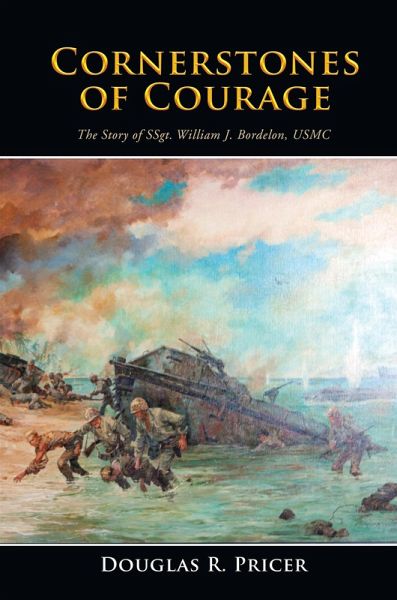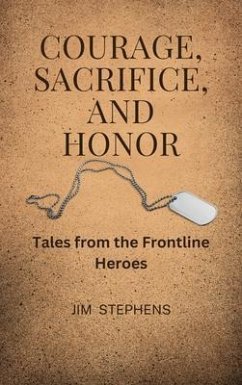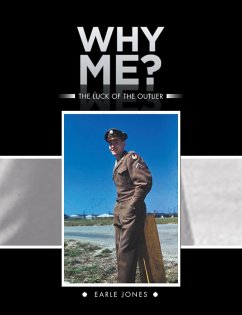
Cornerstones of Courage (eBook, ePUB)
The Story of Ssgt. William J. Bordelon, Usmc
Versandkostenfrei!
Sofort per Download lieferbar
2,99 €
inkl. MwSt.
Weitere Ausgaben:

PAYBACK Punkte
1 °P sammeln!
The Republic of Kiribati (formerly the Gilbert Islands) straddles the equator in the temperate waters of the Central Pacific like a handful of emeralds cast upon a counterpane of brilliant blue. Located 2,400 miles southwest of Hawaii, Kiribati is comprised of sixteen small, flat, palm-covered coral atolls and inhabited by gentle people, many of whom live, as they have for centuries, in villages of thatched huts, where they subsist on a simple fare of coconuts, breadfruit, and fish. Despite the encroachment of modernity and the perils of climate change that erode its beaches, Kiribati remains ...
The Republic of Kiribati (formerly the Gilbert Islands) straddles the equator in the temperate waters of the Central Pacific like a handful of emeralds cast upon a counterpane of brilliant blue. Located 2,400 miles southwest of Hawaii, Kiribati is comprised of sixteen small, flat, palm-covered coral atolls and inhabited by gentle people, many of whom live, as they have for centuries, in villages of thatched huts, where they subsist on a simple fare of coconuts, breadfruit, and fish. Despite the encroachment of modernity and the perils of climate change that erode its beaches, Kiribati remains the same dreamy paradise that once inspired the great Scottish writer Robert Louis Stevenson, who sailed these waters aboard the schooner Equator in the late 1800s. Today, these beaches continue to attract lovers of the sea who eschew the beaten path. But in the fall of 1943, the serenity of these islands was shattered by a horrific battle. For seventy-six blood-soaked hours, United States Marines and sailors fought elite Japanese troops to gain control of a strategic airstrip on the tiny island of Betio. The conflagration became known as the Battle of Tarawa, named for the atoll where it took place. When it was over, nearly five thousand men lay dead, their bodies putrid and bloated under the blazing equatorial sun. So ferocious and heroic was the fighting that Time magazine correspondent Robert Sherrod, an eyewitness, compared Tarawa with epic battles such as Concord Bridge, the Alamo, and Belleau Wood. President Franklin D. Roosevelt honored the contribution of every Marine and sailor who was there with the Presidential Unit Citation. Sadly, the Battle of Tarawa is all but forgotten todaya victim of the unsentimental passage of time and the shameful paucity of history taught to our young. But for the few who still survive, and for all Marinesliving or deadthe sacrifices and horror of Tarawa will never be forgotten. For them, the assault on Betio both defined and forged their mission in World War II and proved them to be an elite and fierce amphibious assault force. In doing so, it created a pantheon of heroes. This story is about one of those heroes: Marine SSgt. William James Bill Bordelon. Bordelon courageously gave his life at Tarawa, and on June 17, 1944, his parents were presented our nations highest award for valorthe Medal of Honoron behalf of a grateful nation. As with all heroes, Bill Bordelons life was much more than the few violent moments in combat for which we honor him. He was a loving son, a kind and protective brother, a proud Texan, a fighting Marine, and a patriotic American. The courage and leadership he displayed were a testament to the efficacies of his family, his faith, a disciplined Catholic education, and the transcendent ethos of the Marine Corps. It was these values, these cornerstones of courage, that became the lodestar of his life and led him to immortality. In Gilbertese folklore, it was the Spider Lord Nareau te Moa-ni-bai, the first of things, who, from the dark embrace, created the world from a mussel shell and filled the heavens over his islands with a billion stars. The Marines who died at Tarawa in 1943 rose to join those stars, and the brightest of them all were men like Bill Bordelon. May his story serve to honor them all.
Dieser Download kann aus rechtlichen Gründen nur mit Rechnungsadresse in A, D ausgeliefert werden.













